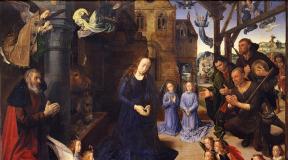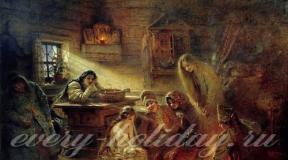The city was miraculously taken by jesus navin. Jesus son navin
Introduction.
In the collection of Old Testament books, Joshua is the first of twelve historical books (the last is the book of Esther). This corresponds to the Septuagint (the Greek translation of the Old Testament), where the books are grouped as follows: Pentateuch (Genesis to Deuteronomy), historical (from Joshua to Esther), poetical (from Job to Song of Solomon), and prophetic (from Isaiah before the book of Malachi). In the Hebrew canon, the same books are grouped differently, namely the Law, the Prophets, and the Scriptures.
With this division, the book of Joshua is the first in the second section of the Old Testament - Prophets. This section was subdivided in turn into two parts: "The Elder Prophets" (from Joshua to the Fourth Book of Kings inclusive, excluding Ruth) and "End-Time Prophets" (from Isaiah to Malachi, not counting the Lamentations of Jeremiah and the Book of Daniel). The Scriptures (according to this canon) include Psalms, the book of Job, Proverbs, the Songs of Solomon, the book of Ruth, the book of Ecclesiastes, the Lamentations of Jeremiah, the book of Esther, the book of Daniel, the book of Ezra, the book of Nehemiah, the first and second books of Chronicles.
Theologians in different ways define the reason for classifying the book of Joshua as prophetic (in the Hebrew canon). Some see it in the fact that Nun was appointed to the "office of the prophet." Others are that history books, including the "senior prophets," reflect the principles that the prophets preached.
Author.
The Bible does not say who the author of this book was. Some parts of this book were written by Joshua himself (8:32; 24:26). 4) Other parts of it were clearly written after his death (24: 29-30, which contains a record of his death, and 15: 13-14, about the conquest of Hebron by Caleb.
Time of writing.
Since Joshua wrote a significant part of the book, the date of its creation, apparently, is close to the date of the events themselves. According to 1 Kings. 6: 1, the Israelites left Egypt 480 years before the 4th year of the reign of King Solomon, that is, 480 years before 966 BC By adding these numbers, we get the date of the exodus - 1446 BC ...
Forty years later (after wandering in the wilderness) began the conquest of the Promised Land, which means - in 1406 BC, which is confirmed by the testimony contained in the Court. 11:26. According to Jephthah, the period from the conquest of the earth to his days was 300 years (Judges 11:26). Adding to them (and to forty years) one hundred and forty years, which separated the days of Jephthah from the 4th year of the reign of Solomon, we get four hundred and eighty, which is consistent with what was said in 1 Kings. 6: 1 (forty years in the wilderness, plus three hundred years from the conquest of the earth to the days of Jephthah, plus one hundred and forty years from Jephthah to the 4th year of the reign of Solomon, is four hundred and eighty years.
Since most of the victories were won by the Israelites over a seven-year period (cf. commentary on Joshua 14:10), they probably took possession of the land sometime around 1399 B.C. Accordingly, the book of Joshua was completed, not counting minor additions to it shortly thereafter.
Purpose of writing.
The purpose of the book of Joshua is an official account of how the Lord's promise to the patriarchs to hand over the land of Canaan to the Jews was fulfilled in the history of Israel. This can be seen both from the command given to Nun at the beginning of the book (1: 2-6), and from the summing up of the events at its end (21:43).
The conquest of Canaan under the leadership of Joshua had its justification in the Abrahamic covenant. God, the ruler of the universe, placed Abraham at the center of the fulfillment of His plan, predestinating through the Abraham seed to "reach" our "lost world." The Lord made a treaty or covenant with Abraham, promising the patriarch and his descendants, without any preconditions, the earth, the continuation and multiplication of the clan and spiritual blessings (Gen. 12: 2-3). Soon after, God said that He would give this land to Israel forever (compare Gen. 13:15).
Abraham was made aware of the boundaries of this land (Gen. 15: 18-21). Later, God declared that Isaac and his descendants would become the legal heirs of the Promised Land (Gen. 17: 19-21). Thus, the book of Joshua records how the promise made to the patriarchs was fulfilled as Israel took possession of the land that God had promised him many centuries before.
The fact that the people later lost this land reflects the inconstancy of the people, who, having perceived God's blessings as something given to them once and for all, fell into paganism, began to worship the gods of neighboring peoples, for which they were subjected to the punishment that God warned them about (compare Deut. 28: 15-68). And yet, according to the promise he received, Israel should forever own the land given to him, but this is already connected with the return of the Messiah and Israel's repentance.
According to Isaiah's prophecy, the Messiah will appear as the "second Joshua", who will "restore the earth in order to return to the heirs" their inheritance (Isaiah 49: 8).
The Apostle Paul taught that the events of the Exodus and Conquest are filled with special significance for Christians, since these events are nothing more than types of the future (1 Cor. 10: 1-11). “Jesus” is the Greek word for JEHOSHUA, meaning “Jehovah saves” or “Jehovah is salvation”. How Joshua led Israel to victories over their enemies and to take possession of the Promised Land, and how he prayed and interceded for the people after they sinned and failed, so does Jesus Christ. He leads God's people to their promised rest (Heb. 4: 8-9); He continually intercedes for His own (Rom. 8:34; Heb. 7:25) and empowers them to defeat their enemies (Rom. 8:37; Heb. 2: 14-15).
Book outline:
I. Invasion of Canaan (1: 1 - 5:12)
A. Joshua's appointment (chapter 1)
1. Navin listens to the Lord (1: 1-9)
2. Navin gives command to commanders ("overseers") - 1: 10-15.
3. Navin receives support from the people (1: 16-18)
B. Reconnaissance Operation in Jericho (Chapter 2)
1. Sending scouts to Jericho (2: 1)
2. "Spies" take refuge with Rava (2: 2-7)
3. Information received by the spies from Rahab (2: 8-11)
4. The Promise of the Rahab Spies (2: 12-21)
5. Return of the scouts to Joshua (2: 22-24)
C. Crossing the Jordan (chapter 3)
1. Preparation for the transition (3: 1-4)
2. Consecration on the occasion of the passage (3: 5-13)
H. Completion of the transition (3: 14-17)
D. Setting stones in memory of the Jordan crossing (chapter 4) E. Consecration of the Israelites (5: 1-12)
1. Renewal of circumcision (5: 1-9)
2. Celebrating Easter (5:10)
3. Using the fruits of the land (5: 11-12)
II. Conquest of Canaan (5:13 - 12:24)
A. Introduction: Leader of the Host of the Lord (5: 13-15)
B. Major War Campaign (5:16 - Chapter 8)
1. Taking Jericho (chapter 6)
2. Defeat at Guy (chapter 7)
3. Victory at Guy (chapter 8)
B. Southern Campaign (chapters 9-10)
1. Union with the Gibeonites (chapter 9)
2. Navin protects the Gibeonites (chap. 10)
D. Northern Campaign (11: 1-15)
1. Coalition of Kings (11: 1-5)
2. Battle (11: 6-15)
E. Overview of victories (11:16 - 12:24)
1. Conquered lands (11: 16-23)
2. Defeated kings (chapter 12)
C. Section of Canaan (chapters 13-21)
A. Allotments of two and a half tribes (chap. 13)
1. Command from above to divide the earth (13: 1-7)
2. Special award of lands to the eastern tribes (13: 8-33)
B. Nadel Haleva (chapter 14)
1. Introduction (14: 1-5)
2. Caleb at Kadesh Barnea (14: 6-9)
3. Caleb during the wandering in the wilderness and during the conquest of the land (14: 10-11)
4. Caleb in Hebron (14: 12-15)
C. Allotments for Nine and a Half Tribes (15: 1 - 19:48)
1. Put on for the tribe of Judah (chapter 15)
2. Allotments for the tribe of Joseph (chapters 16-17)
3. Allotments for the rest of the tribes (18: 1 - 19:48)
D. Plot for Joshua, for Manslaughter, and for the Levites (19:49 - 21:45)
1. A special lot for Joshua (19: 49-51)
2. Designation of cities of refuge (chapter 20)
3. Designation of cities for the Levites (21: 1-42)
4. Summing up the conquest and distribution of lands (21: 43-45)
IV. Conclusion (chapters 22-24)
A. Clearing up a misunderstanding at the border (chapter 22)
1. Warning from the mouth of Nun (22: 1-8)
2. A Symbolic Act Performed by Eastern Tribes (22: 9-11)
3. The threat of war (22: 12-28)
4. Eastern tribes speak in their defense (22: 21-29)
5. Tribal Reconciliation (22: 30-34)
B. Last days Joshua (23: 1 - 24:28)
1. The last call of Nun to the leaders of the tribes (chapter 23)
2. The last admonitions of Joshua (24: 1-28)
B. Appendix to the text (24: 29-33)
IN orthodox tradition Joshua is revered as righteous, commemoration is performed on September 1 julian calendar.
Biography
Descended from the tribe of Ephraim and originally bore the name Hosea (Hosea), but was renamed by Moses to Jesus (Yehoshua) when he was sent as a scout with representatives of the other eleven tribes. Commentators explain the reason for the change in the name by the prayer of Moses, so that Jesus would remain in his opinion and not follow the rest of the scouts. In the Latin (and then in the Catholic and Protestant) tradition, the name of Joshua is rendered differently than the name of Jesus Christ - Josua instead of Jesus, while in the Greek Orthodox tradition, both are called Jesus (therefore, Joshua or the son of Nun is usually added to the name of the first while in the western tradition it is superfluous). Joshua is nicknamed Navin after his father, Nav or Non. The obsolete suffix -in is added to the name Nav, which, like -ov, indicates belonging.
Immediately after the death of Moses, God appeared to Jesus and said to him:
The first thing the Jews, led by Jesus, attack Jericho. For seven days, their troops march around the city walls, led by priests carrying the ark of the covenant. On the seventh day, the army circled the city seven times, accompanied by priests playing trumpets. At a certain moment, Jesus orders all the people to shout at the same time, and immediately the walls of the city fall by themselves.
After that, Jesus orders to exterminate the entire population of Jericho, including women, old people, children and livestock. Only the harlot Rahab and her relatives were spared for the fact that Rahab had previously sheltered the Jewish scouts who had entered the city. Jericho himself was completely burned (Joshua, chapter 6).
Further, having entered the Promised Land, he defeated several Canaanite tribes in a number of battles, despite the fact that they sometimes opposed him in whole coalitions. Jesus conquered the city of Ai, and completely destroyed its population, as in Jericho. Five kings - Jerusalem, Hebron, Hieramuf, Lachish, and Yeglon united against the Israelites. However, Jesus managed to defeat them. God took part in the battle on his side, throwing stones from heaven at the enemy's army:
Five kings, having suffered defeat, hid in one of the caves. But they were found and Naveen ordered to kill them and hang them in the trees. Then the Jewish army captured the cities of Maked, Livna and Lachis. All residents of these cities were massacred without exception. The king of Gazer came to the aid of the king of Lachish, but the Israelites prevailed and destroyed his people completely. The same fate befell all the inhabitants of the cities of Eglon and Hebron:
- The image of Joshua is embroidered on one of the banners of Ermak, kept in the Armory of the Moscow Kremlin.
- The phenomenon on Mercury, when the Sun stops in the sky and moves in the opposite direction, is called the Joshua effect.
- The image of Joshua takes place in film adaptations in the 1956 film "The Ten Commandments", as well as in the second half of the film
Joshua
During the first battle with the Amalekites, the Israelites had a new military leader.
Ex. 17: 9. Moses said to Jesus: choose husbands for us, and go, fight the Amalekites ...
The fact that Joshua appears here without explaining who he is suggests that this passage concerning the Amalekites is out of place and the event described in it took place at the end of the Exodus rather than at the beginning.
Hereafter, Jesus is referred to as Hosea (in the Revised Standard Translation - as Hosiah) and is presented as the son of Nun and a member of the tribe of Ephraim. Apparently Hosea ("salvation") was his real name, and Moses changed it to more closely match Yahviz:
Num. 13:16. ... And Moses named Hosea the son of Nun, Jehoshua.
Yehoshua (short for Jesus) means "Yahweh is salvation."
Throughout the Exodus, Joshua remains Moses' military assistant and eventually becomes his successor as the leader of the Israelites. This is the first evidence of the military superiority of the tribe of Ephraim, which it held throughout the entire period of the tribes of Israel.
In later Old Testament times, the abbreviated form of Yeshua, Yeshua, became more common. In Greek, the sound "sh" (which does not exist in the Greek alphabet) was replaced by the sound "s" and the usual for greek ending of the name with "-s". Thus, Yeshua became Jesus.
Indeed, in the New Testament (originally written in Greek), Yeshua, the military leader of Moses, is referred to as Jesus on two occasions - at least in the King James Bible. Thus, in the Book of Acts of the Holy Apostles, when Stephen summarizes the history of the Old Testament before the Sanhedrin, he speaks of the tabernacle built in the wilderness under the leadership of Moses, which
Acts 7:45. Our fathers with Jesus took it and brought it into the domain of the nations [to Canaan] ...
In the Amended Standard Translation this name at Acts 7:45 is given as Yeshua. Of course, it is completely impossible to replace the name of Jesus Christ with his Jewish version of Yeshua. This name was fixed in the human mind in its Greek form.
From the book Night in the Garden of Gethsemane author Alexey PavlovskyJESUS \u200b\u200bNABIN The Crushing of Jericho Jesus Nabin, who turned eighty-six years old in the days of pondering the plan to take Jericho, the main fortress that guarded the land of Canaan, was an experienced and wise military leader. He did not want to risk it and gave up
From the book The Bible Illustrated author's Bible From the book Newest book facts. Volume 2 [Mythology. Religion] author Kondrashov Anatoly PavlovichHow did Joshua raise the morale of the Israelites after the defeat at the city of Ai? After Jericho, the next city on the way of the Israelites invading Palestine was Gaius. Since this city was much weaker fortified than Jericho, Joshua sent a detachment of only 3
From the book of 100 great biblical characters author Ryzhov Konstantin VladislavovichJoshua After the death of Moses, the Lord called to Joshua and said to him: “Get up and go over Jordan, you and all your people. Go to the land that I am giving you. Be firm and courageous, do not be afraid and do not be dismayed, for the Lord your God is with you everywhere, wherever
From the book Biblical Pictures, or What is "God's Grace" author Lyubimova Elena From the book of the Old Testament the author Melnik IgorJoshua. Jesus became Moses' successor. He gathered the overseers and told them to go through the camp with the instructions: prepare food for three days and prepare for the invasion. Then he sent two spies for the Jordan, to the city of Jericho. The spies went to the city and stopped for the night in a house
From the book Canons of Christianity in parables author author unknownJoshua leaves the harlot Rahab alive (Joshua, ch. 6) ... 20And they put to the curse everything in the city, and men and women, young and old, and oxen, and sheep, and donkeys, [everything ] destroyed by the sword. 21And to the two young men who were looking out for the earth, Jesus said: Go to the house of that harlot and bring
From the book The Illustrated Bible of the authorJoshua and the soldier of the Lord. Joshua 5: 13-15 Jesus, being near Jericho, looked, and saw, and here was a man standing before him, with a drawn sword in his hand. Jesus approached him and said to him: Are you ours or one of our enemies? He said no; I am the leader of the host of the Lord, now
From the book Biblical Legends. Legends from the Old Testament. author author unknownJESUS \u200b\u200bNABIN IN THE PROMISED LAND After the death of Moses, God said to Joshua: - Cross the Jordan River. Be strong and courageous, and then you will hand over to the people the land that I swore to give to their fathers. Carefully preserve and obey the law that Moses bequeathed to you. Joshua sent
From the book Biblical Legends author author unknownJESUS \u200b\u200bNABIN IN THE PROMISED LAND After the death of Moses, God said to Joshua: - Cross the Jordan River. Be strong and courageous, and then you will hand over to the people the land that I swore to give to their fathers. Carefully preserve and obey the law that Moses bequeathed to you. Joshua sent
From the book of the Bible. Modern translation (BTI, translation by Kulakov) author's BibleJoshua - the successor of Moses Moses, finishing his speech addressed to all Israel, 2 said: “I am one hundred and twenty years old now, and I can no longer go on campaigns with you, and the Lord told me:“ You are not destined to go beyond Jordan". 3 Now He Himself, the Lord your God, will pass
From the book Guide to the Bible author Asimov IsaacJoshua During the first battle with the Amalekites, the Israelites had a new military leader. Ex. 17: 9. Moses said to Jesus: choose husbands for us, and go fight the Amalekites ... The fact that Joshua appears here without explaining who he is suggests that
From the book of the Lives of the Saints. Old Testament Forefathers author Rostov DemetriusJoshua In the Hebrew Bible, the first five books (the Law) constitute one of the three major sections of the Old Testament. The next section includes twenty-one books that together make up the Prophets. The first six of them, mostly historical, are “early
From the book of Forty Biblical Portraits author Desnitskiy Andrey SergeevichRighteous JESUS \u200b\u200bNABIN 1/14 September His original name was Hosea (see: Num. 13, 9). When the Israelites were preparing to engage in battle with the Amalectans at Rephedim, Moses entrusted him with command over the army (see: Ex. 17, 9). Naveen was forty-four years old at that time. Soon
From the book Forty Questions about the Bible author Desnitskiy Andrey Sergeevich8. Joshua - a warrior in the name of the Lord Moses' helper Moses died on the threshold of the Promised Land, and his successor, Jesus, the son of Nun, was to lead the people into this land (in Slavonic his name is Joshua, it is like a name and patronymic). A whole book in the Bible bears his name. And probably
From the author's bookJoshua, Elijah, Jehu ... It is worth looking at first - where exactly in the Old Testament do we read about such events? First of all, of course, in the book of Joshua. Probably, if there were a vote among modern Christians: which book to remove from the Bible is overwhelming
- (Hebrew jehošua, "god [Yahweh] help", it is assumed that the name Jesus is identical with the name Jašuia, known from diplomatic correspondence from the Egyptian archive of El Amarna in the 14th century BC; Nun patronymic form on behalf of Jesus' father), in Old Testament ... ... Encyclopedia of mythology
Joshua - in the Old Testament, the assistant and successor of Moses, who led the conquest of Canaan by the Israelite tribes, and also led the Israelites in the battle with the Amalekites in Rephidim. He combined the qualities of a commander and a prophet. Precisely to Joshua ... ... Historical Dictionary
Joshua - (Hebrew Yehoshua Bin Nun): 1) the son of Nun from the tribe of Ephraim; instead of the former name Hosea, Moses gave him the name Jesus (Num 13: 9,17). During his wandering in the wilderness, Moses entrusted I.N., who was still a young man (Ex. 33:11), to command the army during ... ... Brockhaus Bible Encyclopedia
JESUS \u200b\u200bNAVIN - in the Bible, the servant and companion of Moses ... Big Encyclopedic Dictionary
Joshua - in the Bible, the helper and successor of Moses. Supervised the passage of Jews across the river. Jordan, the conquest of Canaan and the division of its lands among the Jewish tribes. * * * JESUS \u200b\u200bNABIN JESUS \u200b\u200bNABIN, in the Bible the companion of Moses (see MOSES (prophet)), his successor, ... ... encyclopedic Dictionary
Joshua - Taking Jericho. Fresco in the Church of Santa Maria Maggiore in Rome. 432 440 BC Capture of Jericho. Fresco in the Church of Santa Maria Maggiore in Rome. 432 440 BC Joshua in the Old Testament was the helper and successor of Moses, who led the conquest of Canaan ... ... Encyclopedic Dictionary "World History"
Joshua - - the successor of Moses in the leadership of the Jewish peoples during the conquest of the land of Canaan. I. Navin came from the tribe of Ephraim and was the son of Nun, or Navin. Already during the life of Moses, he was a prominent figure among jewish people;… … Complete Orthodox Theological Encyclopedic Dictionary
Joshua - JESUS \u200b\u200bNABIN (Hebrew Jehoshua - God [Yahweh] - help, the Hellenized Jesus is the savior), according to the biblical tradition, the helper and successor of Moses. Supervised the passage of Jews across the river. Jordan, the conquest of Canaan and the partition of it ... ... Biographical Dictionary
Joshua - according to biblical traditions, servant and companion of Moses (See Moses). I.N.'s book is the sixth in the canon Old Testament and by many researchers it is stylistically combined with the previous five books in ... ... Great Soviet Encyclopedia
JESUS \u200b\u200bNAVIN - according to biblical legends (Book I. N.), the leader of the nomadic Hebrews. tribes, to rye in the 13th century. BC e. conquered most of the Canaanite states in Palestine. Lit .: Dyakonov I.M., Amorei ..., VDI, 1939, No 4 (9); Rowley H. N., From Joseph to Joshua ..., L., ... ... Soviet Historical Encyclopedia
Books
- Joshua, G. Ebers, Georg Moritz Ebers (1837-1898) - German writer and historian. Initially, he was engaged in jurisprudence, and then, during an illness that had confined him to bed for a long time, he began to study ancient languages \u200b\u200b... Category: Second-hand books Series: Story in novels Publisher: Book World, Buy for 308 rubles
- Joshua, Modest Petrovich Mussorgsky, Reprinted sheet music edition Mussorgsky, Modest "Joshua". Genres: Sacred cantatas; Cantatas; Religious works; For 2 voices, mixed chorus, orchestra; Scores featuring the voice; Scores ... Category: Art Series: Publisher:



















